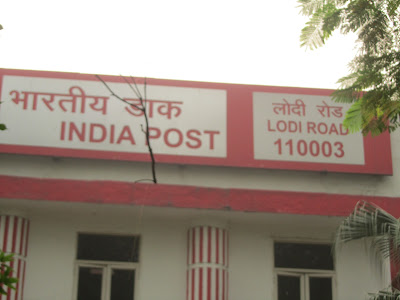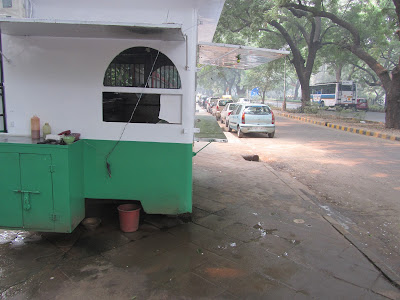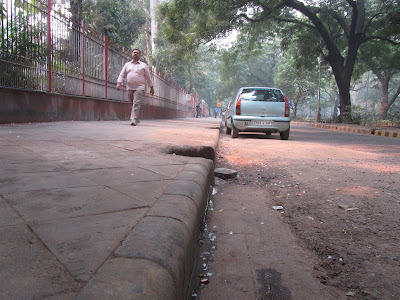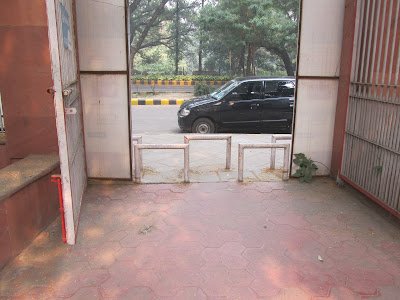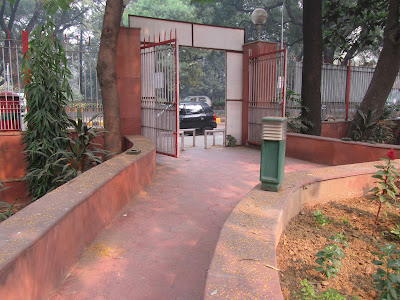29 October 2012,
NEW DELHI: Gulmohar Park's post office exists in the basement of DDA market, down a flight of stairs in a structure with no ramps or lift. That, however, hasn't deterred the south division of the India Post from declaring it "barrier-free" in its reply to an RTI enquiry filed by Dr Satyendra Singh, professor of physiology at University College of Medical Sciences and doctor at GTB Hospital.
Singh, himself disabled, filed a query under RTI Act in July requesting information from the postal department on the levels of accessibility at Delhi post offices. The reply is worrying as many first-floor post offices have no lifts and many of those declared "barrier-free" have stairs leading to them.
South division claims 65 of their 67 post offices (including Gulmohar Park's), are "barrier-free". The ones at Chittaranjan Park and Kailash Colony, it admits, are on the first floor "without any facility of lift". South division also claims that "ramps have been constructed for free movement of wheelchairs" and "height of all the counters has been lowered for easy access".
West division, too, claims "all the post offices of this division are easily accessible and barrier-free". "The two post offices in Rajouri Garden are both on the ground floor. The one in Janta Market has a very high pavement in front of it and the one in the main market is on a narrow and potholed bylane frequently flooded by sewage water and is slippery. A visually-impaired person can't reach that one," says Singh. The postal department didn't reply to his queries immediately but responded only after a first appeal was filed.
Singh travels 10 kilometers to Vasundhara, Ghaziabad, to send a speed post as the post offices closer to home all are inaccessible. "We only have impairments, it's the society which makes us disabled," he says.
North division runs 81 post offices of which 14 are above ground-floor or occupy multiple-floors. As per the division's own admission, "there is no provision of lifts in any post office building". However, the division had written to the executive engineer, postal civil division, for providing assistance as per the Disability Act, in seven post offices (including Ashok Vihar, Civil Lines, Malka Ganj and Rohini Sector 7) first in January 2009 and again in July and September, 2010, "but the needful has not been done yet". Southwest division runs 60 post offices, mostly from rented buildings, and 46 of them don't have ramps for wheelchairs. None of the post offices in the southwest division are on the first floor.
In central division, four post offices are operating from first-floors, "without having the lift" or any "separate arrangement for the people with disability". East division, too, states that "no post office under this division is with the facility of lift" and "no facilities were provided" for people with disability on POs above ground-floor. They say that barring seven post offices (at Krishna Nagar, Azad Nagar, Old Seemapuri, Mayur Vihar, Shahdaramandi, Gandhi Nagar Bazar and GTB Hospital), the rest of their 62 offices are "accessible to all persons with disabilities". Apparently, the stairs (without even handrails) at the PO in Jhilmil Industrial Area are not a barrier.
In the first question, Singh had sought "accessibility status" and explained what he meant by adding parenthetically, "whether accessible/barrier-free or not to persons with disabilities". In reply to this query, the office of the director, General Post Office, informs, "The GPO is centrally located and it is, therefore, accessible for all".
4 November 2012
KOLKATA, 4 NOV: Dr Satendra Singh travels kilometres to post letters, even though there is a post office on the campus of the hospital where he works. “I don't like to tell people, you do this for me,” he said.
Dr Singh, who had polio which left him disabled, is an assistant professor of physiology at the University College of Medical Sciences and GTB Hospital, Delhi. He said he had sent many letters to the hospital superintendent to tell him that the on-campus post office couldn't be easily accessed by him, but didn't get a reply.
Starting to think about accessibility elsewhere also, Dr Singh said, “I decided I should know the status of all the post offices in the Capital of the nation.” A series of RTI responses show that many post offices in the Capital lack the facilities that would bring them in line with the country's obligations as a signatory to the UN Convention on the Rights of Persons with Disabilities, he said.
The Delhi East Division office's response listed seven of the post offices in their zone that are not accessible, for example. The Central Division said, “as per records no such facilities have been provided” in response to his request for details of “all the standard facilities for barrier-free access made available for the Persons with Disability.”
South Division officials said in their response that 65 of their 67 post offices are “barrier-free”, but two ~ one at Chittaranjan Park and the other at Kailash Colony ~ are on the first floor “without any facility of lift”.
Dr Singh was also surprised that the only complaint about accessibility in post offices had, in fact, been filed by him.
“It is shocking. But I am not only blaming the post offices but also the community that they are just sitting there.” He said, in his opinion, this silence is a sign of real disability. “If somebody is not raising his voice, he is truly a disabled person.” If post offices were made accessible, it wouldn't only help the disabled, he said, but also senior citizens and young children.
Dr Singh was also concerned about the response from the Office of the Director of the General Post Office to the questions asking about the “accessible status” of the New Delhi General Post Office, and specifically “whether it is accessible/barrier-free or not to Persons with Disabilities (PwD)”.
“New Delhi GPO is centrally located, it is therefore accessible to all,” the response said. “They thought accessibility meant connectivity,” said Dr Singh.
“A person at a very senior post is not aware of the definition of accessibility, what about lower people...”.
